This step by step woodworking project is about bench seat plans. Building a bench seat for your backyard is easy, but the right plans and techniques should be used. There are so many design options to select from that this project is a real challenge for any person. Irrespective of your choice, only a proper planning will keep the costs under control and it will make building it in a day possible.
Work with attention and with great care if you want to get the job done in a professional manner. Therefore, adjust the size and the design of the bench seat to your needs before starting the actual diy project. Taking into account the bench will be exposed to water damage, we strongly recommend you to use weather-resistant lumber, such as pine, cedar or redwood. Apply a few coats of paint to enhance the look of the project. See all my Premium Plans HERE.
Projects made from these plans
Cut & Shopping Lists
- A – 4 pieces of 4×4 lumber – 16″ long LEGS
- B – 2 pieces of 1×4 lumber – 49 1/2″ long, 2 pieces – 10″ long, 3 pieces – 8 1/2″ long FRAME
- C – 2 pieces of 2×4 lumber – 13″ long, 1 pieces – 49 1/2″ long BRACES
- D – 4 pieces of 2×4 – 53″ long, 2 pieces – 14″ long SEAT
Tools
![]() Hammer, Tape measure, Framing square, Level
Hammer, Tape measure, Framing square, Level
![]() Miter saw, Drill machinery, Screwdriver, Sander
Miter saw, Drill machinery, Screwdriver, Sander
![]() Post hole digger, Concrete mixer
Post hole digger, Concrete mixer
Time
Related
Bench Seating Plans
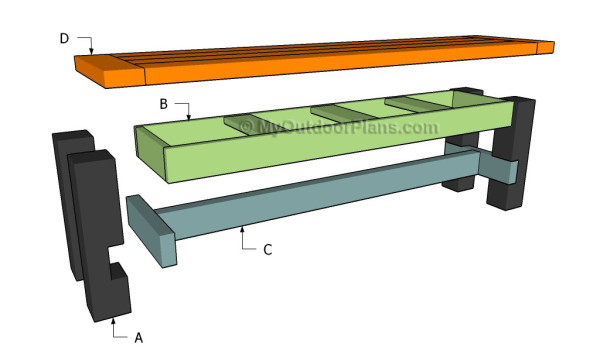
Building a bench seat
Top Tip: Building a rustic bench for your yard is a straight-forward project, especially if you pay attention to several aspects. Cut the components at the right size and align them at both ends before inserting the screws through the components.
Building a bench seating
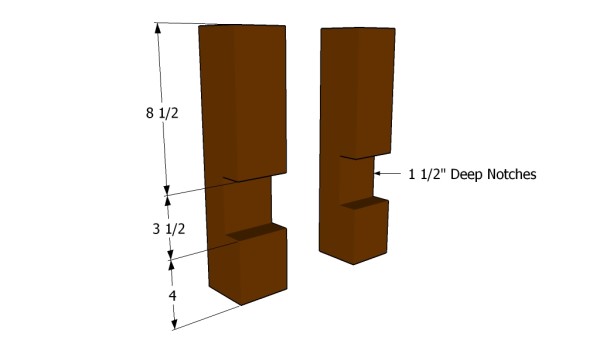
Building the legs
The first step of the project is to build the legs of the bench. As you can notice in the image, you need to cut out several notches inside the legs of the bench seat.
Top Tip: Make several parallel cuts inside the marked area with a circular saw and clean the recess with a chisel. Moreover, smooth the surface by using 120-grit sandpaper, until you get a professional result.
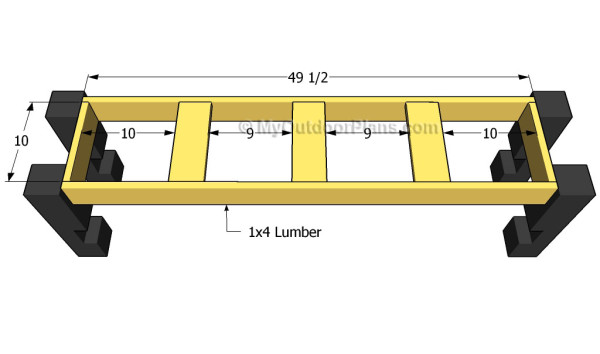
Building the frame of the seat
Afterwards, we recommend you to continue the job by making the frame of the bench seat. Use 1×4 lumber to build the frame as shown in the image. Check if the corners are right-angled and lock them together tightly.
Drill pocket holes at both ends of the 10″ long horizontal supports and lock them to the exterior frame by using 1 1/4″ screws. Lock the frame to the legs with 2 1/2″ screws after checking if the legs are plumb and if the frame is level.

Fitting the bench seat
The next step of the woodworking project is to attach the 2×4 slats to support of the bench. Lay the slats on a level surface, making sure there are no gaps between them. Center the bench frame to the slats, as shown in the image.
Drill pocket holes through the frame and insert 1 1/4″ screws into the slats. Moreover, you should apply waterproof glue between the slats in order to get the job done in a professional manner. The wood works over time using wood glue might not be the best idea if it’s not perfectly died.
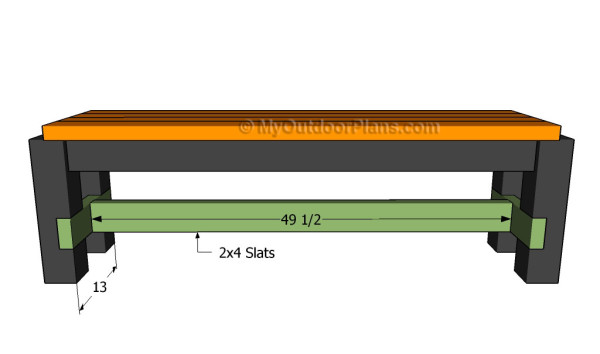
Fitting the braces
Installing the braces to the bottom of the bench is the right thing to do, especially if you want to use the bench for many years in a row. Work with attention ad make sure you cut the 2×4 components at the right size.
Lock the stretcher tightly to the braces placed on both sides of the bench by using 2 1/2″ galvanized screws. Align everything at both ends and make sure the stretcher is perfectly level.

Attaching the end slats
One of the last steps of the project is to fit the slats to the ends of the seat, as it can be easily noticed in the image. Align the wooden slats at both ends and apply waterproof glue to the joints, if you want to get the job done in a professional manner. Drill pilot holes and insert 2 1/2″ screws into the legs.
Alternatively, you can attach the end slats to the seat, before attaching it to the slats. Drill pocket holes at both ends of the seat slats and insert 2 1/2″ screws into the end slats.
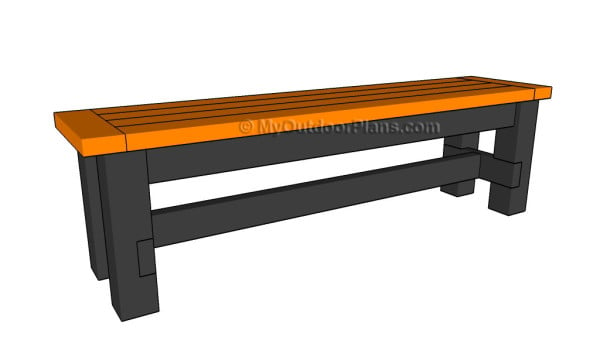
Bench seat plans
One of the last steps of the woodworking project is to take care of the finishing touches. Therefore, fill the pilot holes with wood putty and smooth the surface with 120-grit sandpaper.
Top Tip: In order to protect the lumber from water damage, we recommend you to cover the components with several coats of paint. Place the bench seating in a proper location and refresh the coating every few years.
This woodworking project was about bench seating plans. If you want to see more outdoor plans, we recommend you to check out the rest of our step by step projects. LIKE us on Facebook and Google + to be the first that gets out latest projects.
